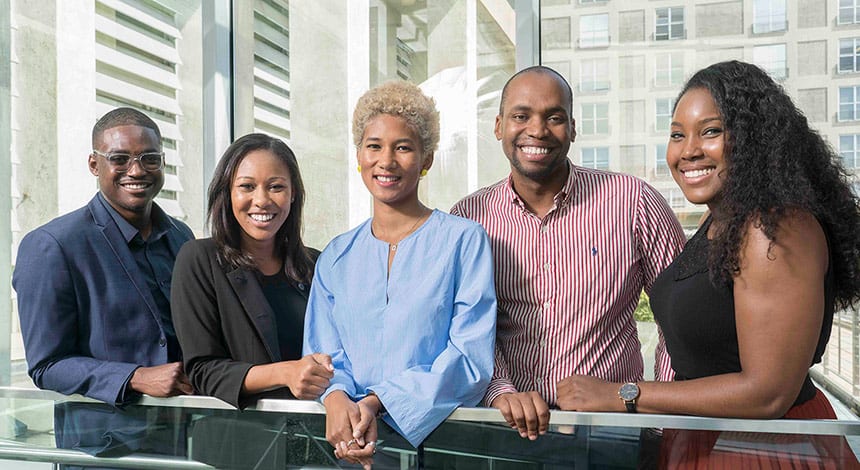
By Andrew Cohen
They harbor no delusions of grandeur or self-importance, grasping fully that long-entrenched racial inequities persist throughout the legal system. But for the five current African American editors-in-chief of Berkeley Law journals—the most to hold that title simultaneously—any chance to help level the playing field is time well spent.
Travis Mitchell ’19, who leads the Berkeley Business Law Journal, believes that having African American students in leadership positions fuels confidence and resolve in younger students of color—and highlights the diversity within Berkeley Law’s African-American community.
“The five of us are from very different backgrounds and we’re exploring disparate areas of the law,” Mitchell says. “Discarding the myth that there is a monolithic way to be or act Black in law school is important in making Black students feel more comfortable and attain success. I also think it serves as a sign posting that Berkeley is a supportive and nurturing environment for them.”
A Kirkland and Ellis diversity scholar, Mitchell was a Teach for America corps member and a vice principal for two years before law school. He was assigned a mentor as a 1L, who helped him navigate law school and secure an in-house summer position. That further stoked his interest in business topics, and in joining his journal’s board.
Mitchell’s fellow trailblazing editors-in-chief are Saxon Cropper-Sykes ’20 (Berkeley Journal of African American Law & Policy), Djenab Conde ’19 (California Law Review), Alycia Tulloch ’19 (Berkeley Journal of Criminal Law), and Drew Washington ’19 (Berkeley Journal of Entertainment & Sports Law).
Filling the void
A first-generation Jamaican-American, Tulloch’s interest in criminal law stems from the criminal justice system’s impact on immigrant families of color and its disproportionate affect on African Americans.
After joining the Berkeley Journal of Criminal Law as a 1L, she “saw a lack of representation on the journal. … I believe that membership can mirror leadership, so I felt compelled to run for editor-in-chief.” Tulloch hopes to provide articles that use an intersectional approach to research, including—but not limited to—those discussing the racial ramifications of new policies and laws.
“Some people believe that choosing articles discussing racial issues means sacrificing quality,” says Tulloch, a Berkeley Law Diversity Scholar as a 1L. “However, it is not the case that we have to sacrifice slotting quality articles in order to have articles that address the racial inequalities rampant throughout the criminal justice system.”
As a student at UC Santa Barbara, Cropper-Sykes developed a student-of-color retention program and helped coordinate African American outreach, retention, and graduation initiatives. He won awards for cross-cultural coalition building, service and leadership in building a strong LGBTQIA campus community, and advanced scholarship and service to African-American communities.
Drawn to the Berkeley Journal of African American Law & Policy by a desire to promote intersectional discourse, Cropper-Sykes wants to support critical legal scholarship and provide a platform for diverse faculty across the country.
“This is a vital role when considering the lack of diversity within the legal profession and specifically within academia,” he says. “It’s extremely important to have greater diversity within top journal positions. Greater diversity within any organization is beneficial to the organization as a whole because of the value of different perspectives.”
Making history
Conde, the California Law Review’s first African American woman editor-in-chief, sees two ways law journals can help promote diversity: seek to publish underrepresented perspectives in the legal profession, and elevate different issues through symposia and conferences.
Partnering with Berkeley Law’s Thelton E. Henderson Center for Social Justice, her journal will present “20 Years of 209: the Past, Present, and Future of Affirmative Action in Public Universities” at the school on November 2.
“It’s definitely special to make history,” says Conde, who before law school ran Morocco’s chapter of a nonprofit focused on empowering young women. “There’s always something sad and lonely about being a ‘first,’ however, because why did it have to take so long? Regardless, bringing in more diverse perspectives can only help make things—everything—better.”
Washington also made history as part of the school’s first all African American female journal board last year, when she was managing editor of the Berkeley Journal of Entertainment & Sports Law and helped planned the annual sports law conference.
A standout track and field athlete at NYU who studied sports management, “the sports industry’s legal framework has always been an interest of mine,” Washington says. Eager to help diversify a male-dominated paradigm, she is no stranger to swimming upstream.
“It’s far too common that leadership positions at the nation’s top law schools are held by individuals who don’t look like myself,” Washington says. “Representation of students of color, and particularly African Americans, in these roles is crucial. It gives us a voice in shaping the scholarship that drives our legal community, and signals to individuals of our own communities that they too have a right and a path to these positions.”